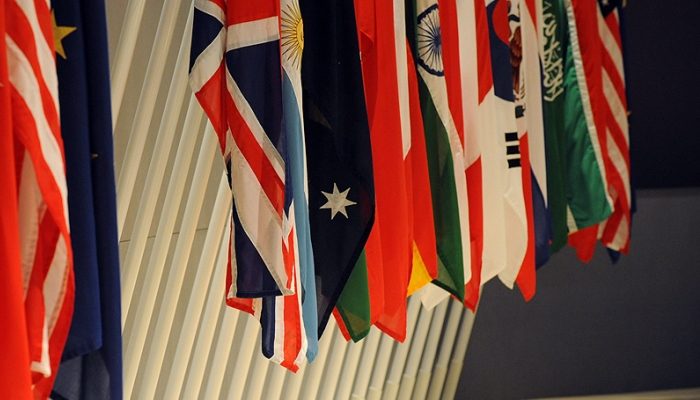
G20 Governance for a Globalized World
By John J. Kirton
Farnham: Ashgate, 2013
The Group of 20 (G20) is one of the most influential actors in global governance today, its reach having gradually expanded from its original focus on economic and financial issues to development, climate change, terrorism and other issue areas. Kirton is among the foremost scholars of the G7, G8 and G20 who has observed and researched the “G’s” for some two and a half decades. He brings to this book his insights based on a solid foundation in political theory, empirical knowledge and extensive interviews and other policy dialogue with scholars and government officials the world over.
The book is divided into five parts. Part I deals with analyzing G20 governance. In his introduction, Kirton explains the significance of G20 governance, presents an account of various assessments of G20 governance, and presents his objectives and approach to the subject. This is followed by a detailed analysis of and argument for what the author terms “the systemic hub model of G20 governance,” placing this model in international relations theory and enumerating the underlying causes of G20 governance: economic and financial shocks, common vulnerability of G20 members, the failure of other established international institutions, and equal capabilities of members to respond to shocks and challenges, the nature of members’ domestic political control, and converging political characteristics (this is a less convincing position, given the great diversity of G20 members).
Parts II and III concern the launching and development of the G20 at the level of finance ministers and central bank governors. Here, Kirton explains the process and circumstances of the creation of the group in 1999 and tracks progress meeting-by-meeting, looking at plans and preparations, conduct of the meetings, achievements of each, and the dimensions and driving causes of the group’s performance. Part IV discusses and analyzes the formation of the leaders’-level G20 in 2008 and the progress of G20 summitry through the Toronto summit of June 2010. It is only in Part V that Kirton analyzes the subsequent summits of Seoul (November 2010), Cannes (November 2011) and Los Cabos (June 2012), referring only briefly to prospects for the then-upcoming 2013 St. Petersburg summit. It would have been more logical to include these updates in Part IV where the earlier summits are discussed. Part V is devoted to a summing-up of Kirton’s argument and conclusions: the cadence and drivers (which the author calls “causes”) of G20 governance, contributions to international relations theory, and the future of G20 governance.
Kirton’s book is a systematic, solidly-argued, well-structured and comprehensive examination of the G20. The author reviews various schools of thought about the G20 and argues that it is a crucial systemic hub of global governance. He provides a chronological survey and analysis of the emergence, evolution, institutionalization and performance of the G20, first at the finance ministers’ and central bank governors’ level starting in 1999, then maturing in 2008 into a heads-of-state summit supported by an elaborate apparatus of ministerial fora and various task forces. He analyzes G20 performance in six dimensions, offering a framework for understanding the complexity of this forum: domestic political management, deliberation, direction-setting, decision-making, delivery and development of global governance (the alliteration is perhaps intended as memory aid). As well, he compares the record of the G20 with that of other institutions of global governance.
In summary, Kirton argues that the G20 has become “the centre of global economic governance for a globalized world” and provides scenarios for the future of the G20. The book is rounded out by an extensive bibliography of scholarly sources, government publications and media accounts, and several useful appendices.
The author makes a persuasive case for the prominent place of the G20 in the galaxy of global governance bodies. However, his rather broad focus on the failure of those other institutions – particularly the UN – is problematic as it does not acknowledge the world organization’s role as the central “hub” of global governance and the UN’s real achievements in international law-making, combating corruption and launching or encouraging steps to fight climate change and promote development, among other areas. This is not to say that the UN is not deficient in many respects, yet its sins of commission and omission can largely be placed at the feet of its member states rather than on the organization itself.
Kirton’s work bears comparison with other recent books, each of which takes a different approach. An example is Cooper and Thakur’s The Group of Twenty (G20) (2013), a concise assessment of the G20 both at the finance ministers’/central bank governors’ level and the leaders’ level. It gives a history and analysis of the forum, and surveys debates on: multilateral organizations versus ‘self-selected groups’; the nature of informal leadership, the G20’s composition, emerging powers, and North-South relations. Another recent contribution is Peter Hajnal’s The G20: Evolution, Interrelationships, Documentation, a work of reference and a survey of the G20’s past, present, possible scenarios for its future, and its relationships with international organizations and other state and non-state actors.
Kirton’s book is an important part of the growing body of literature about the G20. Policy-makers, scholars and students of international relations, and the thoughtful wider public can benefit from this major contribution to the scholarship of global governance.
References
Cooper, Andrew F. and Thakur, Ramesh (2013) The Group of Twenty (G20). New York: Routledge
Hajnal, Peter I. (2014) The G20: Evolution, Interrelationships, Documentation. Farnham: Ashgate